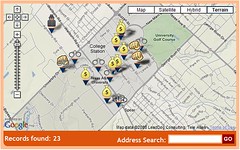Ucrime.com Google Maps Mashup Provides Campus Crime Info
![]() Universities and colleges all over were interested in reporting on the launch of Ucrime.com recently, a Google Maps mashup (from the same folks who created Spotcrime.com). It maps out campus crime incidents for slightly over 200 universities.
Universities and colleges all over were interested in reporting on the launch of Ucrime.com recently, a Google Maps mashup (from the same folks who created Spotcrime.com). It maps out campus crime incidents for slightly over 200 universities.

Crimes at Texas A&M U (click to enlarge)
One of the very earliest Google Maps mashup applications was another site which also pinpointed crime data with its real-world locations: ChicagoCrime.org, created by Adrian Holovaty. Graphically displaying crime info and statistic info onto map locations is one of the more compelling applications for online maps, IMHO. (more…)
Possible Related Posts
Posted by Chris of Silvery on 10/01/2008
Permalink | |  Print
| Trackback | Comments (0) | Comments RSS
Print
| Trackback | Comments (0) | Comments RSS
Filed under: Maps Google-Maps, Mashups, Ucrime.com
Google’s Advice For Web 2.0 & AJAX Development
Yesterday, Google’s Webmaster Blog gave some great advice for Web 2.0 application developers in their post titled “A Spider’s View of Web 2.0“.
In that post, they recommend providing alternative navigation options on Ajaxified sites so that the Googlebot spider can index your site’s pages and also for users who may have certain dynamic functions disabled in their browsers. They also recommend designing sites with “Progressive Enhancement” — designing a site iteratively over time by beginning with the basics first. Start out with simple HTML linking navigation and then add on Javascript/Java/Flash/AJAX structures on top of that simple HTML structure.
Before the Google Webmaster team had posted those recommendations, I’d published a little article early this week on Search Engine Land on the subject of how Web 2.0 and Map Mashup Developers neglect SEO basics. A month back, my colleague Stephan Spencer also wrote an article on how Web 2.0 is often search-engine-unfriendly and how using Progressive Enhancement can help make Web 2.0 content findable in search engines like Google, Yahoo!, and Microsoft Live Search.
Way earlier than both of us even, our colleague, P.J. Fusco wrote an article for ClickZ on How Web 2.0 Affects SEO Strategy back in May.
We’re not just recycling each other’s work in all this — we’re each independently convinced of how problematic Web 2.o site design can limit a site’s performance traffic-wise. If your pages don’t get indexed by the search engines, there’s a far lower chance of users finding your site. With just a mild amount of additional care and work, Web 2.0 developers can optimize their applications, and the benefits are clear. Wouldn’t you like to make a little extra money every month on ad revenue? Better yet, how about if an investment firm or a Google or Yahoo were to offer you millions for your cool mashup concept?!?
But, don’t just listen to all the experts at Netconcepts — Google’s confirming what we’ve been preaching for some time now.
Possible Related Posts
Posted by Chris of Silvery on 11/07/2007
Permalink | |  Print
| Trackback | Comments Off on Google’s Advice For Web 2.0 & AJAX Development | Comments RSS
Print
| Trackback | Comments Off on Google’s Advice For Web 2.0 & AJAX Development | Comments RSS
Filed under: Best Practices, Google, Search Engine Optimization, SEO AJAX, Google, Mashups, Progressive-Enhancement, Search Engine Optimization, SEO, Web-2.0
WikipediaVision Mashes Up With Google Maps and Wikipedia
An addictive little mashup called WikipediaVision has combined Google Maps with live data on updates from the English Wikipedia to display the geolocation of people editing articles in near real-time. The map rapidly pans back and forth across the world, pinpointing the locations of users who have just edited an article, and displaying the name of the article and its hyperlink.
It’s interesting and hypnotic to sit and watch where in the world (more…)
Possible Related Posts
Posted by Chris of Silvery on 11/05/2007
Permalink | |  Print
| Trackback | Comments Off on WikipediaVision Mashes Up With Google Maps and Wikipedia | Comments RSS
Print
| Trackback | Comments Off on WikipediaVision Mashes Up With Google Maps and Wikipedia | Comments RSS
Filed under: Maps, Research and Development, Tools FlickrVision, Google-Maps, Maps, Mashups, Wikipedia, WikipediaVision


